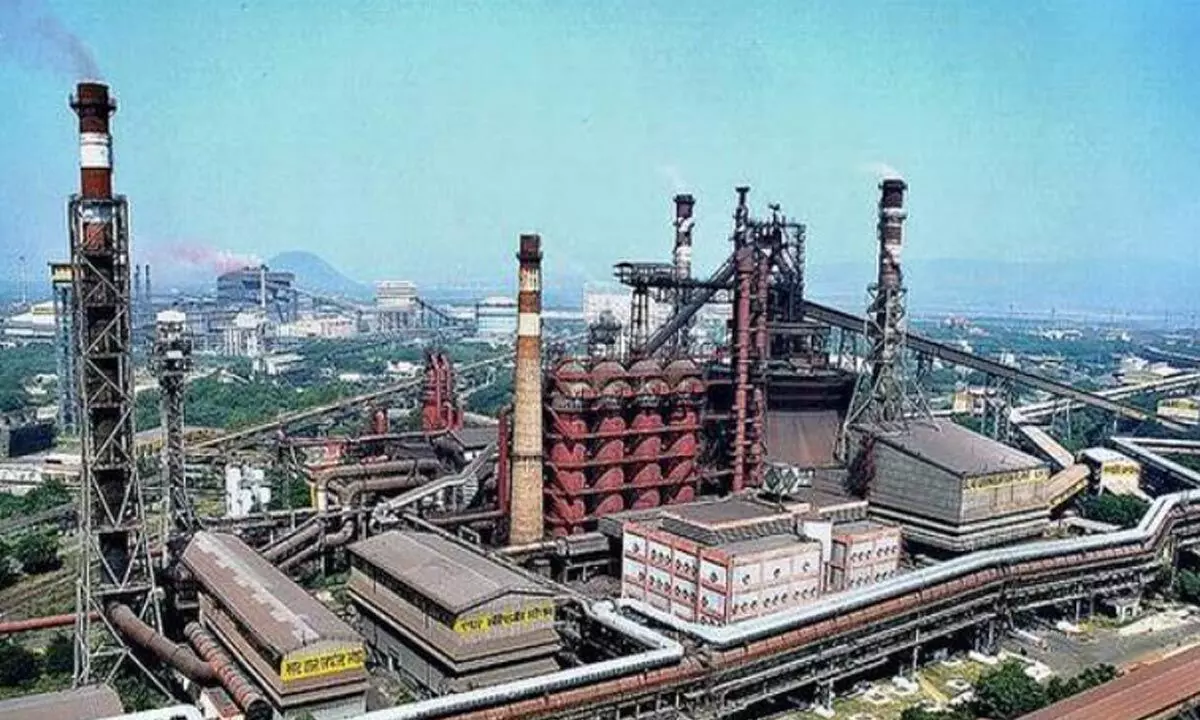RINL executives' final plea to reconsider merger
The association also submitted representation to the Union Steel Minister for pay revision and promotions for the officers due since 2017
image for illustrative purpose

The SEA office-bearers said recent initiatives of Government of India led by Prime Minister Narendra Modi like enhancing budget allocation to infrastructure for railways, national highways, ports, housing sector and low interest rates for housing loans are helpful for the growth of steel sector
Visakhapatnam: The executives of Rashtriya Ispat Nigam Limited, the corporate entity of Visakhapatnam Steel Plant, in a last-ditch effort to save the PSU considered as pride of two Telugu-speaking States of Andhra Pradesh and Telangana, asked the Centre to reconsider their plea for merger of RINL and Steel Authority of India Ltd (SAIL) to make a giant steel company and help achieve the target set in the National Steel Policy to produce 300 million tonne per annum (MTPA) by 2030-31.
A steel plant with high productivity and modern technology as its strength, they said while pointing out the fact that RINL had cloaked a PBT of Rs 942 crore during FY 2021-22. SAIL also plans to enhance its production by 10 million tonne with an estimated investment of Rs 1 lakh crore.
Steel Executives' Association (SEA-the officers' association of RINL) president Katam Chandra Rao, general secretary KVD Prasad and others during their recent trip to New Delhi while vouching the cause of pay revision and promotions for the officers due since 2017, submitted representations to the Union Steel Minister, Steel Secretary designate and others to consider their request for merger of RINL and SAIL as an alternative to prevent strategic sale of the PSU.
Visakhapatnam Steel Plant, which has a capacity of 7.3 MTPA was established after the Visakha Ukku Andhrula Hakku agitation spearheaded by many in various parts of united Andhra Pradesh.
In a representation to Falgan Singh Kuleste, Union Minister of State for Steel, the SEA office-bearers said recent initiatives of Government of India led by Prime Minister Narendra Modi like enhancing budget allocation to infrastructure for Railways, National Highways, ports, housing sector and low interest rates for housing loans are helpful for the growth of steel sector.
RINL/Vizag Steel, one of the best steel plants, started its journey as part of SAIL till 1982. RINL subsequently was formed in 1982 as a separate entity. Unfortunately, captive iron ore mines were not allotted to RINL at that time. SAIL retained the mines reserved for Vizag Steel pushing RINL into a crisis. Since then RINL has suffered for want of captive iron ore and coal mines.
RINL's raw material cost is 63 per cent of production cost whereas that of SAIL's and TATA's is 48 per cent and 35 per cent respectively (both companies have their captive mines).
"RINL is losing about Rs 1500 to Rs 2000 crore per annum exclusively on account of lack of raw material security," Katam Chandra told Bizz Buzz.
Though RINL has been performing well, only on account of high input cost on material, its net profit has become negative for the past four years, added to that huge barrowings (nearly Rs 20,000 crore) from market to increase the plant capacity as per GoI plan. As per the recent reports, for H1 2022-23 SAIL cost of production is Rs 62,062 per tonne of steel compared to RINL's production cost of Rs 68,218.
This is lower than Rs 6,156 per tonne. RINL production cost includes high interest burden of Rs 4,151 (around 8.5 per cent rate taken for expansion) and depreciation of Rs 3,620 (due to additional expansion of 4.2 million tonne as per GoI national steel policy (NSP). Another major reason for the high cost of production in RINL is low utilization of machinery as it could run at less than four million tonne capacity.
If RINL is remerged with SAIL, its cost of production will be much lower than SAIL units and will benefit the government and the nation, SEA pointed out in the representation to the Union Minister.

